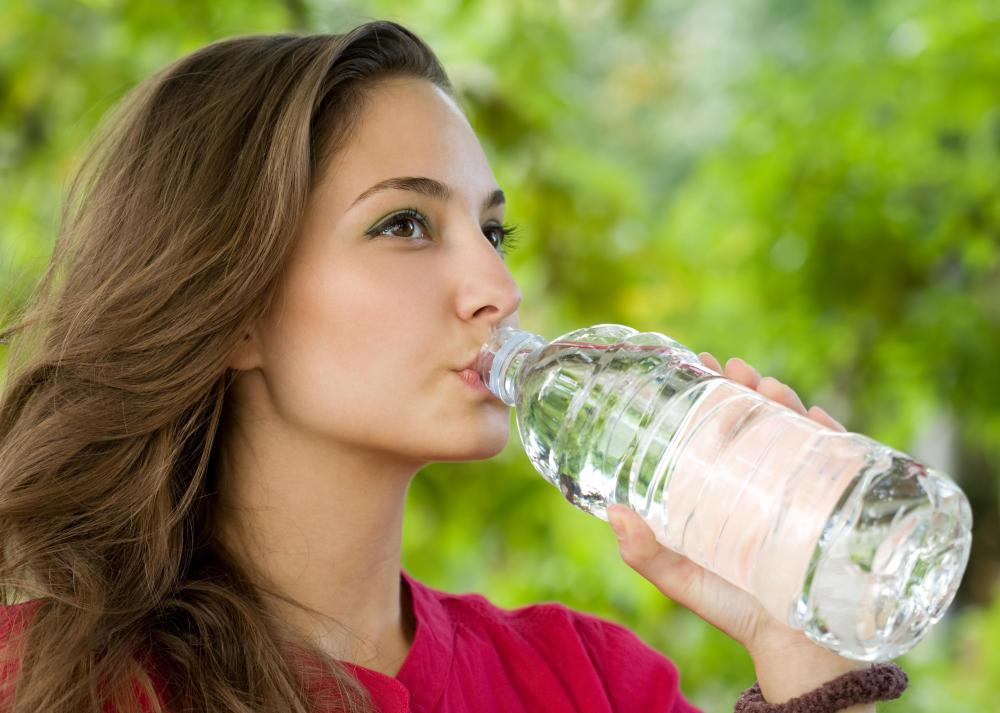At TheHealthBoard, we're committed to delivering accurate, trustworthy information. Our expert-authored content is rigorously fact-checked and sourced from credible authorities. Discover how we uphold the highest standards in providing you with reliable knowledge.
What is Chronic Dehydration?
Chronic dehydration is a condition that results when a person fails to drink an adequate amount of water on a regular or long-term basis. In such a case, the person’s body may not be sufficiently hydrated to perform its normal bodily functions as well as it should. Unlike severe dehydration, chronic dehydration may not cause immediate or obvious symptoms. However, many believe it can have a profound effect on the body.
It’s generally accepted that a person needs about six to eight glasses of water each day. However, other types of drinks contribute to a person's overall intake. For example, drinking juice and milk can help a person stay hydrated, but these drinks also add sugar and calories while water contains neither thing. Eating plenty of fruits and vegetables can help a person stay hydrated as well. Caffeinated beverages are not considered good choices for staying hydrated, as caffeine may have a dehydrating effect.

One effect of chronic dehydration is dry skin. A person who does not drink enough water or other liquids may notice dry, flaky skin that takes on a dull look. Her skin may itch and her lips may chap as well. This can also affect her scalp, leading to excessive dryness, flaking and itching in that area. While using skin and scalp moisturizers can help, the effects are only temporary. In order to see real improvement in dry skin, a person should drink more water and other liquids.

Someone person with chronic dehydration may also experience problems related to digestion, as water is vital for both digesting food and eliminating waste from the body. A person who is chronically dehydrated may have frequent indigestion or bouts of unexplained nausea and vomiting. She may also struggle with frequent constipation, as stool becomes dry and difficult to pass when a person is dehydrated.

Without enough water in the body, a person may also seem more tired than usual. This is because blood contains plasma, a liquid that transports hormones and nutrients through the body, and plasma is about 90 percent water. Without enough water, the heart has to work harder to pump a lower-than-normal amount of blood through the body and ensure that the muscles receive enough oxygen. This can cause a person to feel more tired than normal.

Drinking too few fluids can even have an effect on a person’s joints. Water makes up a large portion of cartilage, and cartilage may be damaged as a result of poor fluid intake. In fact, a person who is chronically dehydrated may be more likely to suffer from arthritis and other joint conditions. The discs of the spine may be affected also, as they contain water, becoming herniated and causing the affected person pain.
AS FEATURED ON:
AS FEATURED ON:
















Discussion Comments
I also find that if I switch from water to sports drink throughout the day then I am able to drink more than if I simply drink water or another liquid alone. Also, I make a point of waking in the middle of the night and drinking a glass of water, which I keep on my night table. This way I don't go 8 hours without any liquid.
Drentel - Yes, not everyone's body absorbs and releases water and other liquids in the same way or over the same time intervals. As the article said, the 8 glasses of water is a good rule, but many people need more liquid than 8 glasses a day to stay fully hydrated.
When I was lifting weights regularly, I was advised by other weightlifters to keep a bottle or some kind of container of liquid with me at all times as a reminder. I would sip on water all day and refill the bottle as needed. Until I started doing this I was battling chronic symptoms of dehydration.
I drink at least 8 glasses of liquid a day, but I still have problems with chronic dehydration. This is primarily because I am active and during the warm months I sweat more than normal. During the summer, staying hydrated is something I have to be conscious of all day.
Post your comments